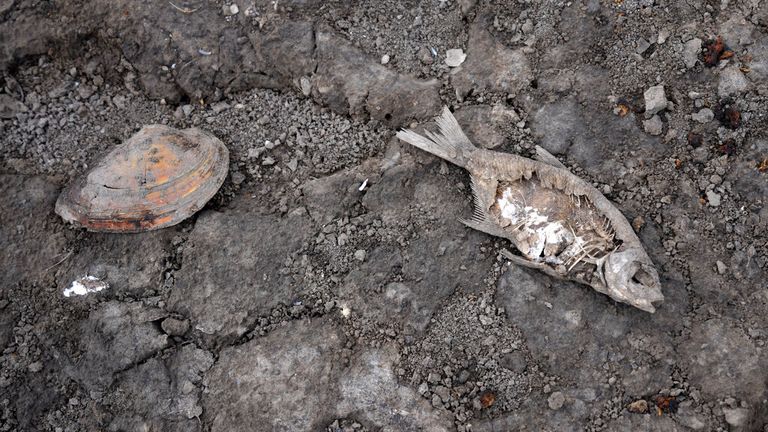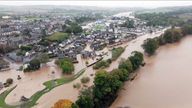Drought inflicting 'severe impacts' on EU energy production, as Putin tightens squeeze on gas
Sky News recently reported the continent is facing its worst drought in at least 500 years, and the situation is "worsening," the European Drought Observatory (EDO) warned in its latest monthly report.
Tuesday 23 August 2022 20:40, UK
Ongoing drought is wreaking damage on the European Union's energy generation, its drought agency warned today, just as the bloc braces for power blackouts in winter as Russia squeezes its gas supply.
Sky News recently reported the continent is facing its worst drought in at least 500 years, and the situation is "worsening," the European Drought Observatory (EDO) warned today in its latest monthly report.
In a summer of savage wildfires, harvest reductions and major rivers drying up, the substantial lack of rain has also wreaked "severe impacts" on the EU's energy sector, hampering both hydropower generation and cooling systems of other power plants.
"The weather is set to remain warmer and drier than usual in the western Mediterranean region until November," warned Johannes Bahrke, spokesperson for the European Commission, which oversees the EDO, citing commission scientists.
Several European countries also continue to face a rise in temperatures and a dramatic lack of rain.
In Portugal and the north of Italy, hydroelectric energy stored in reservoirs is below half the average of recent years. In Italy it is "still slowly decreasing", according to the EDO's August report.
Almost two thirds (64%) of the EU is under drought "warning" level, with low water levels, or the most severe "alert" status, when crops and plants starts to suffer too.
At the beginning of August, nuclear power operator EDF reduced its output at a plant in southwestern France due to high river temperatures on the Garonne, and it has issued rolling warnings for reactors along the Rhone river.
The water shortage compounds existing problems with maintenance and cracking that has seen half France's reactors shut down, adding more pressure on the European grid.
The news comes days after Russian state-owned energy company Gazprom announced it would shut down a key gas pipeline to the bloc at the end of this month. Natural gas prices rose on Friday after the announcement, and are now more than twice as high as a year ago.
Read more:
Spike in gas prices threatens big troubles for European economies
The latest shutdown will come a month after Gazprom restored natural gas supply through the pipeline to only a fifth of its capacity, after a previous closure for maintenance.
In Germany, the government has passed a law to bring back 24 coal fired power plant units in order to start generating more electricity from coal as it faces gas shortages.
The law was passed in July but only one coal plant has come back online so far due to supply issues.
These supply issues have been caused by coal barges not being able to pass down the river Rhine with full loads due to the drought.
Ysanne Choksey, policy advisor for climate change think tank E3G, said: "Coal barges unable to bear a load of climate destroying coal down the river Rhine because of a record drought caused by climate change, is a stark reminder of the macroeconomic dangers of the climate crisis."
This summer's unprecedented drought is damaging agriculture, forcing water restrictions, fuelling wildfires and threatening aquatic species.
In terms of crops, "exceptionally hot and dry weather conditions in large parts of Europe continue to substantially reduce yield outlooks", added Mr Bahrke.
Harvests of maize, soybeans and sunflowers are set to be 12-16% lower than the average for the last five years.
Climate breakdown is making drought in the Mediterranean more severe and more likely, although it is not to blame for all droughts globally.
Causes of drought are complex, but climate change affects it in two key ways. It concentrates rainfall into shorter and more intense bursts, making it harder to retain, and brings hotter temperatures that evaporate more water.
Watch the Daily Climate Show at 3.30pm Monday to Friday, and The Climate Show with Tom Heap on Saturday and Sunday at 3.30pm and 7.30pm.
All on Sky News, on the Sky News website and app, on YouTube and Twitter.
The show investigates how global warming is changing our landscape and highlights solutions to the crisis.



